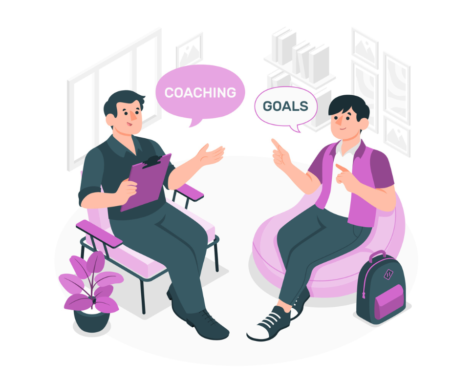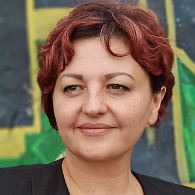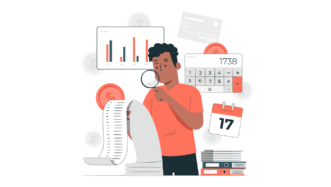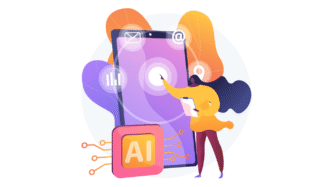LESSON OVERVIEW
The main objectives of this ESL lesson on coaching and mentoring are to:
- talk about the difference between coaching and mentoring;
- practise phrases about personal development;
- watch a video about a coaching session.
With this lesson, students reflect on situations where people seek help (e.g. feeling stuck in a rut), explore the difference between coaching and mentoring and exercise phrases related to personal growth (e.g. stay on track, steer clear of mistakes, etc.). Students share opinions on coaching and mentoring services and watch a video about a coaching session. They also read about a tool called Powerful Questions and reflect on their personal goals.
WARM-UP AND VOCABULARY
This ESL lesson on coaching and mentoring starts with a warm-up. Students read situations where people might feel unfulfilled (e.g. feeling stuck in a rut, being less productive than you’d like to, having very few friends, etc.) and discuss how they usually deal with it. After that, they read a statement about coaching and mentoring and discuss how the statement explains the difference between the two concepts. Next, students read sentences about possible differences between coaching and mentoring and choose the correct word or phrase (e.g. stay/stand on track) to complete each sentence. Following that, they complete opinions about coaching and mentoring using one word in each gap. By doing so, students create phrases (e.g. hold someone back, get the most out of something, navigate through obstacles, etc.). Then, they choose one opinion they agree with and one they disagree with and explain their position.
VIDEO AND DISCUSSION
At this point in this ESL lesson on coaching and mentoring, students discuss questions about the role and effectiveness of coaches and mentors. Then, they watch the first part of a video about a one-on-one coaching session and complete sentences with the information from the video. After that, students watch the second part of the video and make notes on what the coach mentions about different archetypes (the Warrior, the Magician, the Lover). Next, they discuss questions about opinions on coaching sessions and methods. Finally, students read about a coaching tool called Powerful Questions and do tasks where they set and discuss personal goals for self-improvement.
HOMEWORK/REVISION
This lesson plan also includes an additional task that you can use as homework or revision. In the task, students think of responses to create mini-dialogues and use the target vocabulary from the lesson. They also write two dialogues. The task is available in the teacher’s version of the worksheet. You can print it and hand it out to your students. It’s also included in the e-lesson plan.















What a great topic! Just what I needed! Thank you:)
Thank you so much for your feedback! We’re happy this topic appeals to you 🙂
great worksheet
Thank you so much for your feedback! 🙂
I’m trying to familiarize everything but i think this lesson is great for students
Thank you for your feedback, Mary! 🙂
I’m afraid to say that this lesson bombed a bit with my classes… They really struggled to understand Tony Robbins and those who were able to follow what he said found him to be very unlikeable with nothing to say with any substance. Sorry!
Thank you for sharing your feedback! We’re sorry to hear the lesson didn’t live up to your expectations. Was it just the video part that didn’t appeal to your students?
The link to the article seems to have been lost… 😮
Hi there! We’re experiencing some problems with links in pdfs, so it might seem like they’re broken, but I’m pasting the link to the article you’re referring to here so that you can access it. Hope that helps!
Thank you so much! 🙂
An incredible lesson-plan. What made me speechless is questions in the end of the lesson. They’re amazing and very relevant. They are great for self-coaching. Thanks for such a great work!
Thank you so much for your feedback! We’re trying our best to make our lessons relevant to real-life contexts. Happy you found this one useful for you 🙂
I need to ask about the video—the link in my PDF leads to a different video than the one on the website. It used to lead to the Tony Robbins video, though. Something has changed. The “new” video in the PDF is much better because it lasts a bit more than 1 minute (5 minutes is too long, in my opinion). But my question is—what video do the questions in the PDF refer to?
Hi! We’ve just checked that and the links in PDFs and on the website lead to the same video, so we’re not sure what other video you refer to. Please, contact us at [email protected] with more details.
excellent comprehensive material, my student was just amazed
thnx a lot!!
Thank you for your feedback! We’re happy your student enjoyed the lesson 🙂
Thank you so much! Great lesson, lots of opportunities to use the new language in natural conversation!
Thank you so much for your comment, Carol! We’re delighted you enjoyed the lesson 🙂